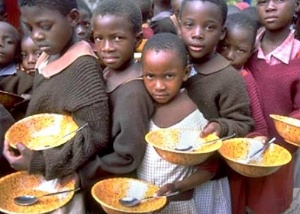 While DietsInReview.com’s primary focus is weight loss, disease prevention and overall health and wellness, we are switching our focal point to discuss the other end of the health spectrum – poverty and malnutrition – two hand-in-hand health issues that affect more than 80 percent of the citizens of Haiti, the small island that was wrecked by a massive earthquake this past Tuesday.
While DietsInReview.com’s primary focus is weight loss, disease prevention and overall health and wellness, we are switching our focal point to discuss the other end of the health spectrum – poverty and malnutrition – two hand-in-hand health issues that affect more than 80 percent of the citizens of Haiti, the small island that was wrecked by a massive earthquake this past Tuesday.
As tens of thousands are feared dead and international humanitarian efforts are underway, it is important to consider just how serious this disaster is for the nine million citizens of this impoverished country. And in order to do that, a glimpse into the health challenges that Haiti faces can provide a subtle background into just how dire the situation is and how serious it may become in the coming days, weeks and months.
The following statistics are from a report developed by the United Nation’s Development Programme (UNDP):
- Haiti is the poorest country in the Western Hemisphere, with more than half of the population living on one dollar or less a day.
- The country ranks along with Afghanistan and Somalia with the world’s worst daily caloric deficit per inhabitant.
- One out of every three deaths is a child, and Haiti’s rate of 118 deaths per thousand live births for the period studied is by far the highest in the Western Hemisphere and likely to get worse.
- Sixty percent to 80 percent of the population is at risk of exposure to malaria while the incidence of tuberculosis is endemic and is the sixth-largest cause of death.
- At current rates of transmission, 10.5 percent of the population will be infected with HIV/AIDS by 2026, compared to 6.31 in 2002 and 4.98 in 1996.
- According to the World Food Programme, acute undernutrition among children under five years of age is 9 percent. Chronic undernutrition is 24 percent and 50 percent of pregnant women and two-thirds of children under five are affected by anemia.
These statistics are nothing short of daunting. And while it is in our intrinsic human nature to want to reach out to the Haitians and offer what support we can, government officials are encouraging those who want to donate money to do so to reputable and well-known relief agencies. Doctors Without Borders (Médecins Sans Frontières) and the Red Cross are two such organizations. Find them on Twitter @MSF_USA and @RedCross.
In the wake of this humanitarian crisis, the thoughts and condolences of the entire DietsInReview.com team are with those who are directly and indirectly affected by this tragedy.
